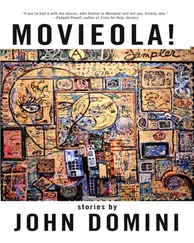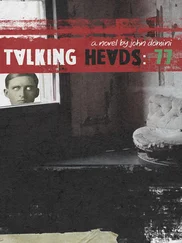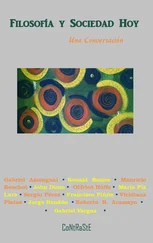After the group reached the center of the camp, the mother tried twice to point the way back to the parking area. Wrong each time. The Jaybird corrected her, stepping in front of her and thrusting out his chest.
“Listen,” Barb said, “I’m not sure the kids can—”
“Kids,” Jay said, “I’ll tell you what to look for. If you’re ever lost in here, just look for your family.”
He pointed at something closer by. At the corner of a broad tent hung a wide and ornately framed photograph, another group shot, a rough match to the one up by the parking area. The portrait itself, now that Barbara looked at it, held several heads in the surreal fixity of the Sears Roebuck studio. One of those heads however was impossibly enlarged, some kind of trick with the copier. For this was a copy, a doctored full-color scan of a shot Barb had seen before. This was her and the children, in a free portrait she’d won at a church raffle a year ago. The enlarged head was her own, mushrooming above the kids’ as if she were the family Vesuvius.
“I don’t ask this guy about the technology,” Jay announced, waving a hand at Silky Kahlberg. “I don’t want to know.”
“No,” the Lieutenant-Major said. “You don’t want to know.”
He was fluttering his lapels, getting some air under his pretty jacket. Not that you could see what he might have in the armpit.
Jay went on with the story. A number of the refugee families, he explained, had arrived at the site with, of all things, a hefty self-portrait. “Hey,” the father said, “everybody wants a picture of themselves. Think about it, it’s like I.D.” In the camp, however, the ungainly squares and ovals took up space in tents already crowded. In a couple of cases, the odd item of salvage made the neighbors jealous. So after a few days of getting to know his site, The Boss had hit on a plan for community building.
“It was time,” Jay said, “we had some signage.”
Circulating with his least-busy staff members, he’d labeled and cataloged all the larger, more garish frames — and Barb for one realized what that part of the process was about, community building among his colleagues, tunneling through their built-up suspicions when it came to Americans. Jay had insisted, too, that the records be kept in English, Italian, and French. Then he’d rounded up volunteers from around the camp.
“Oh,” Barbara said, “I get it. You—”
“Now this next part,” Kahlberg said, “this is the miracle part, if you ask me.”
Jay’s volunteer homeless had gone around collecting the catalogued pieces. The families had let Barbara’s smiling but still-unknown husband remove their family photos and take the fittings, though often it was their sole possession of any value. The Center took them away peaceably, with nothing but a piece of paper in return.
“I just figured,” Jay said, “the Site could be a city and a nation. A nation, it says somewhere, is just the same people living in the same place.”
Again, Barb understood better. She could appreciate how the Americano’s fair business practices had mattered less to the people in camp than the picture of his family. At the same time as he’d asked for their frames, he’d shown them what he had at stake, in Naples: his own little band of runaways, smiling and airbrushed. He’d shown them what he’d given up.
The mother tried to explain. “These clandestini , for them it’s probably been years since they saw anything like this.”
“That’s just technology,” Jay said. “Silky does it in the NATO shop.”
“No, I’m saying, the way we look, it must’ve seemed like we come from—”
“The liaison officer,” Silky said, “has access to all document functions.”
He went on smiling, between the tips of his hair, tucked back and poking from under his ears. Meanwhile, Jay pointed towards the reshaped portrait overhead. Even the NATO guards looked up at it, letting their rifles hang slack.
“Signage,” Jay said. “Now everybody’s got an address.”
The light through the blue plastic visor made the mother’s mushroomed head all the stranger. Barb recalled that she’d been a nervous wreck on the day of the shot, still been trying to make a go of it with Maria Elena, their Mexican ward. At least she’d known better than to spring that girl on the folks at the photo studio.
“We-ird,” Sylvia said. “It’s like the stuff Chris shows us on the web.”
“But that’s so we can find it,” Dora said. “Right Papa? If we’re lost, we just look for the weird stuff.”
“Hey, you got it,” Jay said. “Smart girls. You got it.” Then as he gave the photo another look, did Barbara see him shake off a chill?
The way Jay put it was, so long as he had the extra hands, he was going to put them to work. Kitchen duties for the girls, carpentry assignments for the boys. But when Barb asked where she fit in, her husband dropped his eyes. Wherever you like , he said, scrubbing his forehead with a calloused palm. The wife, aware she was under NATO scrutiny, briskly declared she’d make herself useful in the camp chapel.
Good thing, too. Best to look busy when, it turns out, the family’s Public Relations Department has arranged for the media. The reporters joined them after the Lulucitas moved into the community kitchen. Cooking took place in an open-sided tent, where standing fans whirred between the ropes, but even so a patch of heat-fog lay between the broad steel stoves. Jay handed out smocks and gloves, and the girls fitted on each other’s hairnets, refusing Mama’s help. Then the air got closer still. Along one open wall gathered another knot of visitors, white folks.
“Well, meno male,” said Silky. “Meno male.”
Chris was the first to translate: “less bad,” acceptable. Among the new arrivals, a couple of the men were getting out notepads, and the lone woman clicked on her video-camera. Five reporters, altogether, everyone wearing the Southern Italian version of business casual, a lightweight dress shirt. They all knew Silky and seemed comfortable with his Dixiefied Italian. Indeed as the liaison made the introductions, including the names of the newspapers and the TV stations, he might’ve laid on the compone more thickly than usual. Might’ve played to the stereotype, keeping the press comfortable.
Not that the refugees trusted the man, whatever his accent. Barbara, checking around the kitchen, realized that the campers tended to allow Kahlberg the same space as they gave his gunmen. But the poveri at once proved great fans of the press, especially the two with cameras. Several crowded in behind the reporters, and beyond the kitchen’s floor-fans, outside, you saw fresh clusters of naked feet. Inside, the posing quickly turned shameless, the Africans even popping their eyes. The most animated cluster gathered around the woman, a young woman, good-looking. She was new at TV work, if her gloves were any indication. Fingerless thoroughbred leather protected the girl’s hands, and she kept adjusting her grip.
Barb, for her part, hid her face. She fussed with her hairnet. Anyway the NATO liaison was directing the media elsewhere, towards “il famoso Paul.”
Here amid the stainless steel, however, Mr. Paul didn’t appear particularly famous. Jay had made the boy strap on a carpenter’s tool belt, breaking up his stark color scheme, and the work-gloves muted his hands. As he nodded under the cameras, he seemed merely young and clumsy. The belt’s hammer-holster hung to his knee. Barbara gathered herself and stepped in beside him, deflecting the reporters’ attention. The eleven-year-old put a gloved hand on her back.
Then the mother found herself fielding a question from out of left field: “How many years are you married?”
Читать дальше












